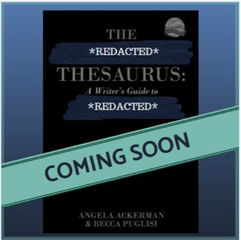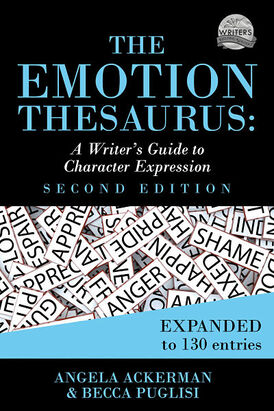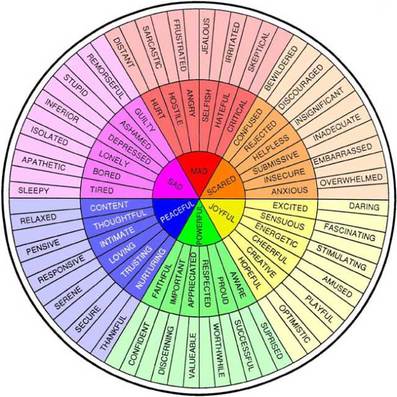 Have you ever held onto a secret you've been dying to share, and then finally...you can? For the last few weeks I've been helping Angela and Becca at Writers Helping Writers keep a BIG secret...what the next book in their thesaurus series will be. It might seem strange to not tell one's readers what book you're planning to release...unless you happen to write books on Show, Don't Tell like Angela and Becca do! They couldn't resist the opportunity to show, not tell, by waiting for the cover reveal. They even created a *REDACTED* cover for it, which you might have seen floating around. We're revealing the cover at long last!*drum roll*  The next book in the descriptive thesaurus series is The Emotion Thesaurus Second Edition! It's been 7 years since the original Emotion Thesaurus hit the shelves. Many writers have credited this unusual book with transforming their writing. This guide is packed with helpful lists of body language, thoughts, and visceral sensations for 75 different emotions, which makes it easier for writers to convey what characters feel. Since 2012, many have asked the authors if they would add more emotions, so that's what Angela & Becca have done. This new edition has added 55 more emotions, bringing the total to 130. There are other new additions to the book and in fact, it's almost doubled in size! I recommend checking out the full list of emotions (and some sample entries) HERE. And more good news: this book is available for preorder! You can find it on Amazon, Kobo, Apple Books(iBooks) and Indiebound. One last thing: go grab some free education! Angela & Becca are giving away a free webinar recording of one of their popular workshops on Emotion, so head over if this is an area of struggle for you. It might really help!
0 Comments
We are taught early on to hide our emotions. If a sibling or friend says something mean to us, our caretaker says to ignore it. Boys are taught not to cry and girls are told they’re overreacting. Adults learn to show only socially acceptable, surface emotions. When creating character emotions, writers should dig below surface feelings. When I first came across this Feeling Wheel, I was so joyful (excited/fascinated) by the possibilities. Knowing the deeper, raw emotions can create more complex character emotions and influences dialogue, as well. Emotions have a direct impact on how characters communicate, the words they use to convey or hide their true feelings, and the sound or tone of those words. Here’s a scenario: Lexi and Tyler are preparing to go parasailing, something Tyler’s never attempted. Surface feelings: Lexi feels powerful. Tyler feels scared. How would raw feelings affect dialogue for Lexi? If her powerful emotion stems from feeling important/discerning, she’s liable to speak like a leader using statements rather than questions. If they stem from feeling appreciated/valuable, she’ll probably ask questions and try to boost Tyler’s confidence. How would raw feelings affect dialogue for Tyler? If his scared emotion stems for being anxious/overwhelmed, he’s liable to speak in clipped sentences. If they stem from insecure/embarrassed, he’ll probably turn into a comedian to cover his discomfort (Note: this is my character’s specific reaction to this emotion. Your characters might respond differently). The feeling wheel can also be used to discover unexpected emotions. We can use the same parasailing scenario where Lexi feels powerful and Tyler scared and take it one step further. The two are on a boat in the middle of the ocean. Tyler has been cracking Nemo jokes. Instead of delving deeper into the fear spectrum, we could reshape Tyler's emotion into something on the opposite side of the spectrum such as contentment, serenity, or thankfulness. Or even an emotion near fear, such as hostility toward Lexi for her relaxed deposition or even jealousy of her lack of fear. How do your characters respond differently to deeper, raw emotions? What kinds of things do they do to cover them up? |
hello!Writer of sweet and evocative fiction with a dark twist. Categories
All
|


 RSS Feed
RSS Feed